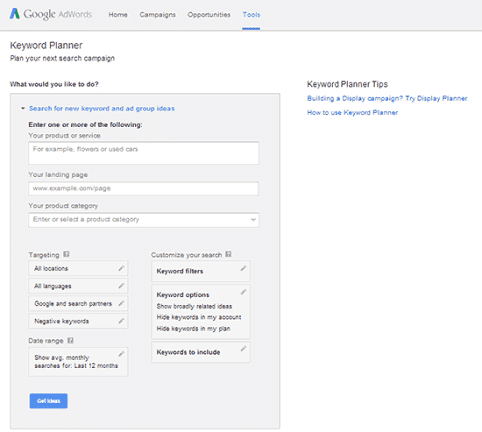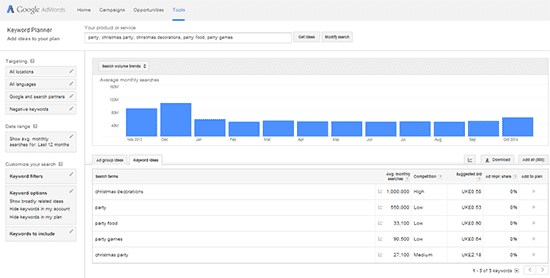If you are a blogger who doesn’t use the Google Keyword Planner tool, then to be frank, you are doing it wrong!
This tool is such an important feature that you need to be using on a regular basis that you just can’t afford to ignore it. Saying that, many people do, whether that is because they don’t know how to use it or maybe simply because they haven’t heard of it before.
Whatever the reason I thought I would put together this post to explain why it is so important and, of course, how to use it for your own site.

What Is ‘Google Keyword Planner’ & Why Do I Need To Use It?
Google Keyword Planner is a free tool that you can use to research and find keywords/key phrases in your niche that you can use on your blog as a whole and for your individual blog posts.
Keywords and key phrases are vitally important for websites to use as it helps them to rank higher in the SERPs (Search Engine Result Pages).
This notion of finding keywords/phrases that can help you rank well can put a lot of people off because, to some, this sounds incredibly complicated. In reality though, this is just a way of finding out what people are actively searching for on the search engines.
For example, let’s say that I wrote a blog post entitled “How to throw a party” that includes lots of great information, images, links, etc. but it isn’t getting that much traffic.
By doing some simple research using the Google Keyword Planner tool I can find out exactly what people are looking for, which leads me to see that people make more specific searches, such as;
- How to throw a good party,
- How to throw a house party,
- How to throw a surprise party,
- How to throw a halloween party,
- How to throw a kids birthday party,
- … and so on.
There probably isn’t anything wrong with what I have written in my post and many people, whatever kind of party they may be throwing, would find it useful, it is simply because people cannot find it because they are searching for more specific kinds of party. My post is being pushed down the ranking for each of these different searches simply because others are being more specific. This is where keyword research comes in.
By understanding the types of words and phrases that people are using to search for things within your niche you can better aim your content for your audience.
By including more targeted keywords/keyphrases in your posts you stand a better chance of getting your content seen by more people and ultimately helping to drive more traffic to your site.
As well as that, keyword research helps you to identify other areas and topics that you can cover in the future on your site as you are giving your audience what they are looking for.
Using Google Keyword Planner
First things first, in order to use the Google Keyword Planner tool you need a Google AdWords account. This doesn’t cost anything to setup and you can use your existing Google (Gmail, Google+, Analytics, etc.) login details to do this, but you will need to set this up before you can start using it.
Once logged in you will be able to search for keywords in four different ways;
- Search for new keyword and ad group ideas,
- Get search volume for a list of keywords or group them into ad groups,
- Get traffic forecasts for a list of keywords,
- Multiply keyword lists to get new keyword ideas.
Each option will let you search for what you are after, they will just give you different info that is all. Just try each of them to find what you are looking for, but in terms of this little guide we will be using the first option (Search for new keyword and ad group ideas).
You have to realise that this tool is meant to be used by companies looking to buy advertising for specific keywords, but we can still use it for keyword research.

Here you want to enter in all the relevant words and phrases that come to mind on a subject that you want to write about. Make sure that you select the right targeting groups (usually ‘All locations’) that fit your website.
You don’t need to add anything for ‘Your landing page’ or ‘Your product category’ as we are only after ideas, that is more for advertising.
So, if I stick with the “party” theme, I would enter in as many relevant words and phrases that come to mind. Let’s make it a bit more specific and try to aim for Christmas as well (not long to go now).

By clicking on the ‘Keyword Ideas’ tab I can see specific information on each of the keywords that I have entered as well as when they are most frequently used within the year.
The most useful information that we will be looking at is the ‘Avg. monthly searches’ and ‘Competition’. Good keywords and keyphrases that you want to aim for are the ones with high average monthly searches and low competition.
By scrolling down the page you will find a list of relevant keywords and phrases that you may find useful. This is where the keyword research really begins.
Like I say, you want to find words and phrases that are searched by lots of people but who have low competition. That just means that they aren’t being used by lots of other sites.
So taking a look at my party example I can see a few relevant ones that I could use, such as;
- Christmas party themes – 5,400 – low
- Christmas party theme – 1,300 – low
- Christmas party appetizers – 1,900 – low
- Fun Christmas party games – 1,600 – low
These could help me put together a targeted post for my party site that I could use, or better yet a couple of different posts that I could write over the holiday season.
The point is that I know from using the Google Keyword Planner tool that these are terms that people are searching for online and, more importantly, aren’t being covered by many other sites (yet). This doesn’t guarantee that my post will get tons of traffic, as other factors come into it, but it does at least give me a better chance of them succeeding.
I like to do some keyword research every few weeks or so. That way, I get tons of ideas for future articles whilst being able to spot current trends that may just be developing. You can go into much more detail with the tool if you like, but just doing a simple search like this can help so much.
Your Turn:
Do you use the Google Keyword Planner tool?
Do you use a different tool that does a similar sort of job?
I would love to hear from you so please leave a comment below.



